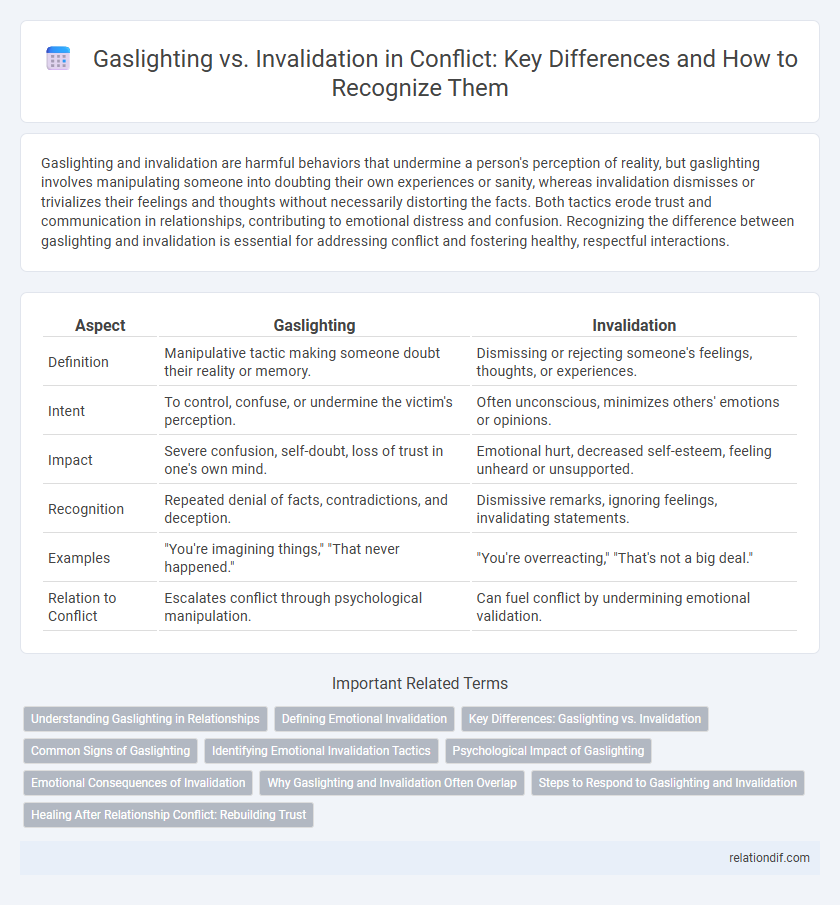Gaslighting and invalidation are harmful behaviors that undermine a person's perception of reality, but gaslighting involves manipulating someone into doubting their own experiences or sanity, whereas invalidation dismisses or trivializes their feelings and thoughts without necessarily distorting the facts. Both tactics erode trust and communication in relationships, contributing to emotional distress and confusion. Recognizing the difference between gaslighting and invalidation is essential for addressing conflict and fostering healthy, respectful interactions.
Table of Comparison
| Aspect | Gaslighting | Invalidation |
|---|---|---|
| Definition | Manipulative tactic making someone doubt their reality or memory. | Dismissing or rejecting someone's feelings, thoughts, or experiences. |
| Intent | To control, confuse, or undermine the victim's perception. | Often unconscious, minimizes others' emotions or opinions. |
| Impact | Severe confusion, self-doubt, loss of trust in one's own mind. | Emotional hurt, decreased self-esteem, feeling unheard or unsupported. |
| Recognition | Repeated denial of facts, contradictions, and deception. | Dismissive remarks, ignoring feelings, invalidating statements. |
| Examples | "You're imagining things," "That never happened." | "You're overreacting," "That's not a big deal." |
| Relation to Conflict | Escalates conflict through psychological manipulation. | Can fuel conflict by undermining emotional validation. |
Understanding Gaslighting in Relationships
Gaslighting in relationships involves manipulating a partner into doubting their own perceptions, memories, and feelings, often causing severe emotional distress and confusion. Unlike simple invalidation, which dismisses or rejects someone's experience, gaslighting actively distorts reality to gain control and power over the other person. Recognizing these signs is crucial for maintaining emotional health and addressing toxic dynamics early.
Defining Emotional Invalidation
Emotional invalidation occurs when an individual's feelings or experiences are dismissed, minimized, or ignored, undermining their emotional reality. This can manifest through refusal to acknowledge emotions, contradictory responses, or trivializing personal struggles, contributing to relational conflict. Recognizing emotional invalidation is crucial for addressing gaslighting, as it often serves as a subtle form of psychological manipulation that erodes trust and self-esteem.
Key Differences: Gaslighting vs. Invalidation
Gaslighting involves manipulating someone's perception of reality to make them doubt their own memories or feelings, often leading to significant psychological distress and confusion. Invalidation, while also dismissive of emotions or experiences, primarily entails denying or minimizing someone's feelings without necessarily altering their sense of reality. The key difference lies in gaslighting's intentional distortion of truth versus invalidation's focus on rejecting emotional legitimacy.
Common Signs of Gaslighting
Common signs of gaslighting include persistent denial of facts, deliberate distortion of reality, and repeated undermining of a person's perception or memory. Victims often feel confused, anxious, and doubt their own judgment due to manipulative tactics like trivializing emotions and dismissing experiences. These behaviors differ from invalidation by explicitly aiming to control and distort the victim's sense of truth rather than merely disregarding their feelings.
Identifying Emotional Invalidation Tactics
Emotional invalidation tactics include dismissing feelings, minimizing experiences, and outright denial of emotions, which can cause confusion and self-doubt in conflicts. Gaslighting, a severe form of emotional invalidation, involves manipulating someone to question their reality or sanity, often leading to long-term psychological harm. Recognizing phrases like "You're overreacting" or "That never happened" helps identify these destructive behaviors in personal or professional conflicts.
Psychological Impact of Gaslighting
Gaslighting profoundly undermines an individual's sense of reality, leading to confusion, self-doubt, and diminished self-esteem. Unlike simple invalidation, gaslighting involves deliberate manipulation that distorts memory and perception, causing long-term psychological trauma. This persistent erosion of trust in one's own cognition can result in anxiety, depression, and impaired decision-making abilities.
Emotional Consequences of Invalidation
Invalidation in conflicts can erode self-esteem, leading to feelings of worthlessness and emotional distress. It often causes individuals to doubt their perceptions and emotions, resulting in confusion and decreased trust in themselves. Prolonged invalidation can escalate anxiety and depression, impairing emotional well-being and relational stability.
Why Gaslighting and Invalidation Often Overlap
Gaslighting and invalidation often overlap because both manipulate perception and undermine an individual's reality, making it difficult to distinguish between the two in conflict situations. Gaslighting involves intentional psychological manipulation to make someone doubt their memory or sanity, while invalidation dismisses or rejects a person's feelings and experiences outright. This overlap creates a toxic dynamic that erodes trust and distorts communication within interpersonal relationships.
Steps to Respond to Gaslighting and Invalidation
Recognize and document specific instances of gaslighting and invalidation to clarify the reality of your experiences. Maintain firm boundaries by calmly asserting your perspective and refusing to accept distorted or dismissive narratives. Seek support from trusted individuals or professionals who can validate your feelings and help reinforce your sense of reality.
Healing After Relationship Conflict: Rebuilding Trust
Healing after relationship conflict requires distinguishing between gaslighting, a form of psychological manipulation that distorts reality, and invalidation, which dismisses emotional experiences. Rebuilding trust hinges on recognizing these behaviors, fostering open communication, and validating feelings to restore emotional safety. Establishing clear boundaries and consistent honesty helps repair the damage caused by both gaslighting and invalidation.
gaslighting vs invalidation Infographic

 relationdif.com
relationdif.com